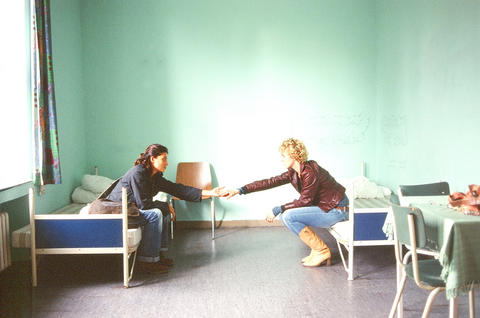The Turkish-German director Fatih Akin's new film has been given a poetic English title for its UK release, but the German original, Auf der Anderen Seite, or On the Other Side, is better. This is an intriguing, complex, beautifully acted and directed piece of work, partly a realist drama of elaborate coincidences, near-misses and near-hits, further tangled with shifts in the timeline — and partly an almost dreamlike meditation with visual symmetries and narrative rhymes.
It is about the tension between Germany and Turkey, to whom postwar West Germany opened its doors for “guest-worker” laborers, thereby getting an economic boost but creating for itself an unacknowledged quasi-imperial legacy of guilt and cultural division. And it is about the gulf between the first and second-generation Turkish Germans, conflicted about their identity and their relation with the old country, itself conflicted as it prepares to join the EU.
At the movie's center is Nejat (Baki Davrak), a second-generation Turk who has attained what might be the greatest distinction Germany has to offer: He is a university professor, lecturing on Goethe. His rascally old father, Ali (Tuncel Kurtiz), also in Germany, has offered cohabitation rights to the Turkish prostitute Yeter (Nursel Kose) for whom he is a regular, and who is only too eager to escape the bullying Muslim activists who patrol the red-light district — but doesn't see Ali's yet unrevealed darker side. Having established this fraught, tense family relationship, Akin spins the narrative thread off sideways to investigate the situation of Yeter's fugitive daughter Ayten (Nurgul Yesilcay) and her relationship with an idealist young German, Lotte (Patrycia Ziolkowska) who between them are reviving the spirit of Baader-Meinhof for a new generation. Lotte's mother is Susanne, played by Hanna Schygulla, a casting decision that is partly a kind of ancestor-worship of Rainer Werner Fassbinder, an acknowledged inspiration for Akin.

PHOTO: COURTESY OF SWALLOW WINGS
It is a glitteringly confident narrative pattern, gesturing at the globalized, historical forces that govern individual lives; in some ways it is like a very, very much better version of Alejandro Gonzalez Inarritu's mediocre film Babel — there is some similar business with a handgun — but not as schematic and superficial. The web of happenstance and dramatic reversals of fortune may teeter on the brink of unbelievability, but it is a measure of Akin's confidence as a storyteller that his world so plausibly enfolds us.
To the political institutions involved, Akin directs a fierce satiric pessimism. A Turkish revolutionary is refused asylum by a German court not on the grounds of terrorist activities — of which it is in fact unaware — but on the Catch-22 basis that a country about to be admitted to the EU club couldn't possibly be tyrannical. Later, after repatriation, we see the Turkish government cut a cynical deal to release this same suspect from prison to placate the German authorities. Amid the bureaucracy and the institutional bad faith, however, individual Turks and Germans find common ground: friendship and love.
This is perhaps not a film for everyone; it does need a leap of faith, though not a very big leap. What I think is beyond doubt is that Akin — already the winner of the Golden Bear at the Berlin film festival for his 2004 film Head-On — is a director who has found a real voice. He tackles big ideas, big themes, in the service of which he creates believable human beings and elicits tremendous performances from his actors. It is bold and exhilarating filmmaking.

Aug. 4 to Aug. 10 When Coca-Cola finally pushed its way into Taiwan’s market in 1968, it allegedly vowed to wipe out its major domestic rival Hey Song within five years. But Hey Song, which began as a manual operation in a family cow shed in 1925, had proven its resilience, surviving numerous setbacks — including the loss of autonomy and nearly all its assets due to the Japanese colonial government’s wartime economic policy. By the 1960s, Hey Song had risen to the top of Taiwan’s beverage industry. This success was driven not only by president Chang Wen-chi’s

Last week, on the heels of the recall election that turned out so badly for Taiwan, came the news that US President Donald Trump had blocked the transit of President William Lai (賴清德) through the US on his way to Latin America. A few days later the international media reported that in June a scheduled visit by Minister of National Defense Wellington Koo (顧立雄) for high level meetings was canceled by the US after China’s President Xi Jinping (習近平) asked Trump to curb US engagement with Taiwan during a June phone call. The cancellation of Lai’s transit was a gaudy

From Godzilla’s fiery atomic breath to post-apocalyptic anime and harrowing depictions of radiation sickness, the influence of the nuclear bombings of Hiroshima and Nagasaki runs deep in Japanese popular culture. In the 80 years since the World War II attacks, stories of destruction and mutation have been fused with fears around natural disasters and, more recently, the Fukushima crisis. Classic manga and anime series Astro Boy is called “Mighty Atom” in Japanese, while city-leveling explosions loom large in other titles such as Akira, Neon Genesis Evangelion and Attack on Titan. “Living through tremendous pain” and overcoming trauma is a recurrent theme in Japan’s

As last month dawned, the Democratic Progressive Party (DPP) was in a good position. The recall campaigns had strong momentum, polling showed many Chinese Nationalist Party (KMT) lawmakers at risk of recall and even the KMT was bracing for losing seats while facing a tsunami of voter fraud investigations. Polling pointed to some of the recalls being a lock for victory. Though in most districts the majority was against recalling their lawmaker, among voters “definitely” planning to vote, there were double-digit margins in favor of recall in at least five districts, with three districts near or above 20 percent in